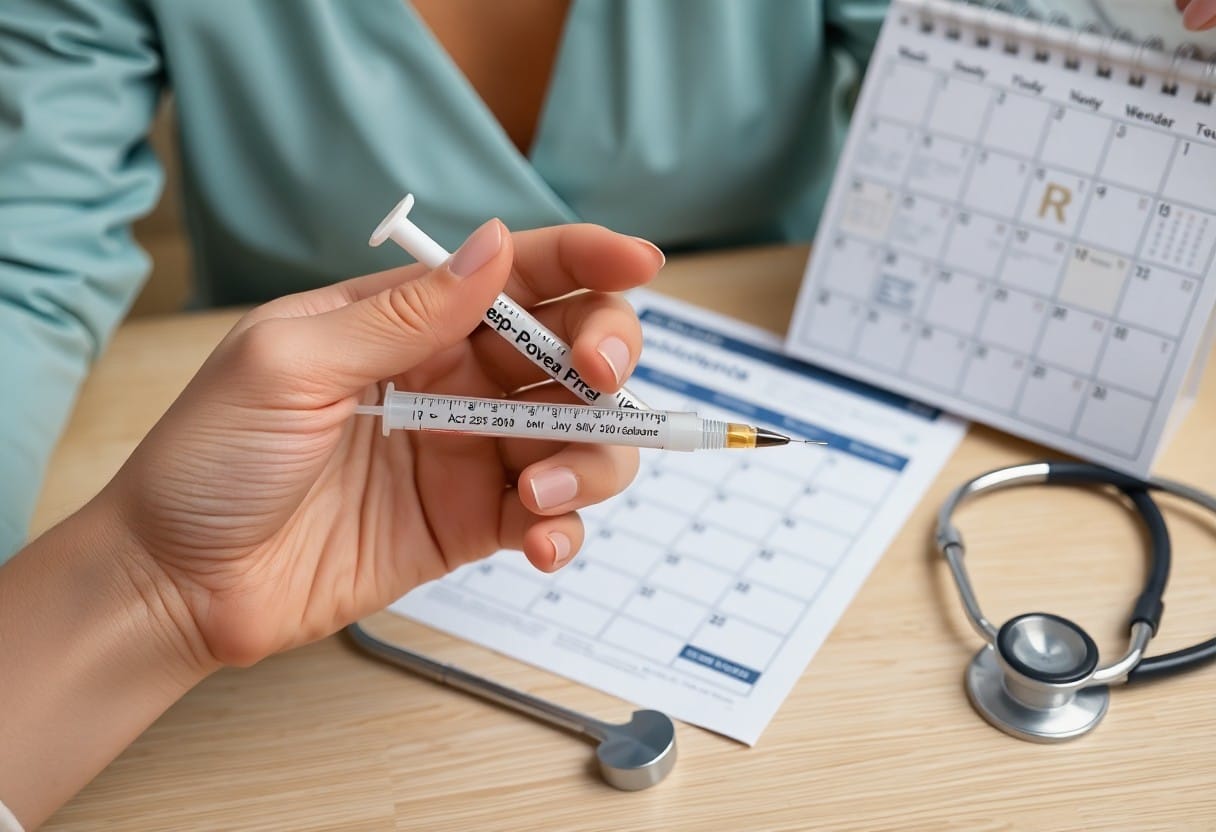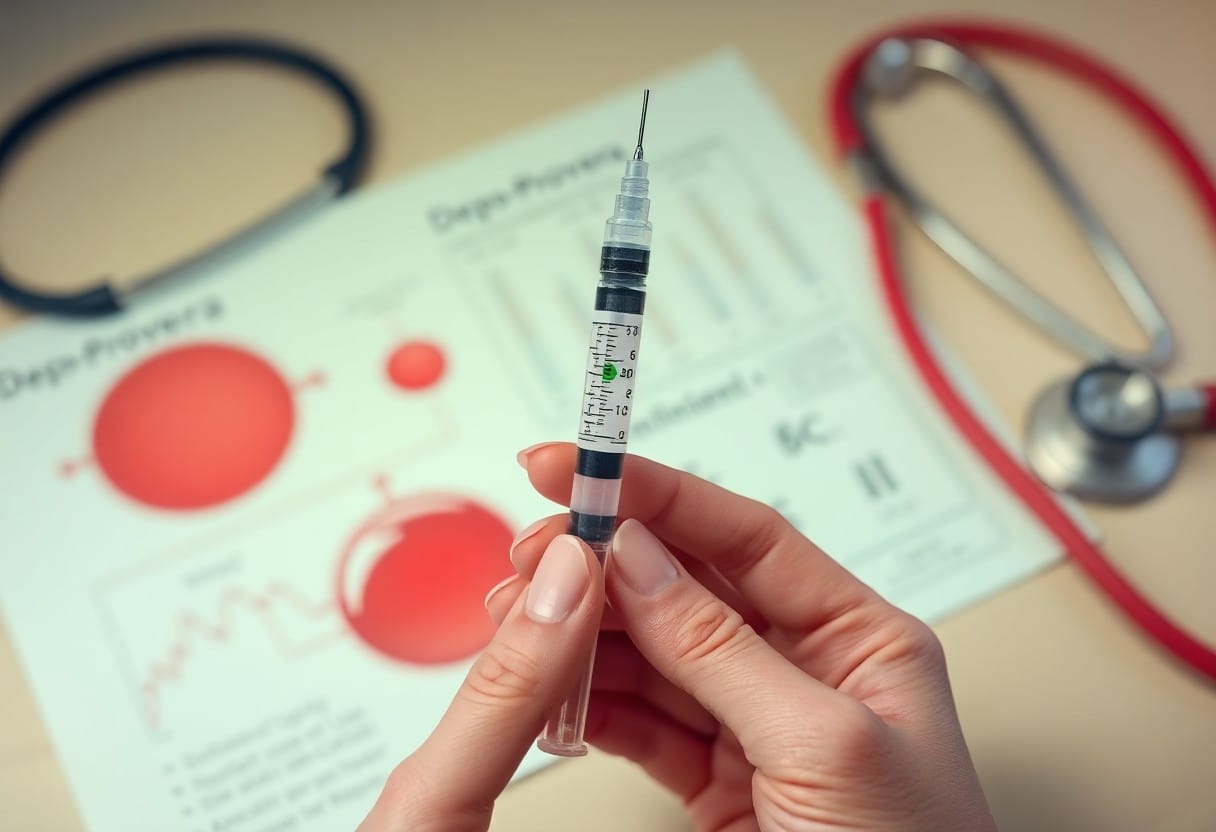Most people are familiar with Depo-Provera as a convenient contraceptive option, but you might not be aware of its potential long-term health effects. While many users experience positive outcomes, such as reduced menstrual pain or lighter periods, others report serious concerns including bone density loss and weight gain. This blog post will investigate into the often overlooked side effects of Depo-Provera, equipping you with valuable information that can help you make informed decisions about your reproductive health.

Overview of Depo-Provera
As a widely used hormonal contraceptive, Depo-Provera offers women an effective way to prevent pregnancy. Administered as an injection every three months, it contains the synthetic hormone progestin, which alters the menstrual cycle and provides contraceptive protection. While it may suit many users, it comes with both benefits and potential long-term health effects that you should consider.
What is Depo-Provera?
With its active ingredient being medroxyprogesterone acetate, Depo-Provera is a type of birth control given via an injection. You receive it every three months, making it a convenient option for those who prefer not to take a daily pill. The method is popular among women for its effectiveness in preventing unwanted pregnancies.
How it Works as a Contraceptive
With its dual mechanism, Depo-Provera primarily functions by inhibiting ovulation and thickening cervical mucus. This means that even if you do have a menstrual cycle, the chances of releasing an egg are significantly reduced. Additionally, the thickened mucus creates a barrier that makes it more difficult for sperm to travel to fertilize any potential egg that may be released.
Overview, Depo-Provera works mainly through two pathways: it prevents ovulation and alters the cervical mucus. By stopping the ovaries from releasing an egg, it significantly reduces the likelihood of pregnancy. The thickened cervical mucus acts as a barrier to sperm, enhancing its effectiveness. While it boasts an impressive rate of preventing pregnancy, you should also be aware of the potential side effects that may arise over time, which can impact your health and well-being.
Common Short-Term Side Effects
Some users of Depo-Provera report experiencing a variety of short-term side effects. These can range from mild to moderate and may vary between individuals. It’s imperative to be informed about these potential effects in order to make an educated decision regarding your reproductive health.
Menstrual Changes
Along with the intended effects of Depo-Provera, you may notice significant menstrual changes. Many women experience irregular bleeding or spotting, while others might find that their periods stop altogether. These changes can be unsettling, but they are often temporary as your body adjusts to the hormonal alterations.
Weight Gain
Across many users, weight gain is a common concern associated with Depo-Provera. While the exact reason for this gain can vary, studies suggest that hormonal changes might affect your metabolism and appetite. Understanding these factors can help you manage any potential weight increases.
With the use of Depo-Provera, you could experience an increase in weight, with averages ranging from 5 to 15 pounds over the course of a year for some users. This weight gain can be linked to hormonal fluctuations, which may alter your appetite and metabolism. It’s vital to monitor your weight and consult your healthcare provider to discuss dietary and exercise options if you notice significant changes. Being proactive can help you maintain a healthy lifestyle while using this contraceptive method.
Long-Term Health Risks
Any long-term use of Depo-Provera can pose significant health risks that you may not have been fully informed about. These risks may include changes in your bone health, potential fertility complications, and other systemic effects. It’s imperative to consider these factors when discussing contraceptive methods with your healthcare provider.
Bone Density Concerns
Around 50% of women using Depo-Provera may experience decreased bone density over time, particularly with prolonged use. This reduction in bone density can increase your risk of osteoporosis and fractures later in life, making it vital to monitor your bone health regularly.
Impact on Fertility
Across many users of Depo-Provera, the return to fertility can be delayed significantly after stopping the injection. While most women may regain normal fertility within a year, some may experience an extended delay that can be concerning if you are planning to conceive.
Plus, being aware of the impact on your fertility is imperative. Some studies indicate that up to 10% of women may take over a year to conceive after discontinuing Depo-Provera, while others report persistent challenges. The altered hormonal balance from this contraceptive method can lead to irregular menstrual cycles and affect your overall reproductive health. Furthermore, if you’re considering pregnancy, it is advisable to discuss your timeline with your healthcare provider to make informed choices.
Psychological Effects
Once again, the impact of Depo-Provera extends beyond physical health, influencing your psychological well-being. Many users report experiencing significant changes in mood, anxiety levels, and overall emotional stability. It’s important to consider how hormonal alterations may affect your mental health, potentially leading to challenges that require attention and management.
Mood Disorders
Against this backdrop, research indicates a potential link between Depo-Provera and an increased risk of mood disorders such as depression and anxiety. It’s necessary for you to be aware of these risks, as they can significantly affect your quality of life.
Changes in Libido
Around this topic, user experiences often highlight notable fluctuations in libido while on Depo-Provera. Some report a decrease in sexual desire, which can impact personal relationships and overall satisfaction.
Considering the changes in libido, users have reported that reduced sexual desire may lead to feelings of frustration and inadequacy, further affecting interpersonal relationships. While some may find the hormonal balance improves their overall well-being, others might find their sexual interest significantly diminished. If you are experiencing this side effect, it may be beneficial to discuss it with your healthcare provider, who could offer guidance and alternative solutions to manage your sexual health effectively.
Comparison with Other Contraceptive Methods
Your choice of contraceptive method plays a significant role in managing your reproductive health. Understanding how Depo-Provera stacks up against other options can help you make informed decisions tailored to your lifestyle and health needs.
Effectiveness
| Contraceptive Method | Effectiveness Rate |
|---|---|
| Depo-Provera | 94% effective with typical use |
| Birth Control Pills | 91% effective with typical use |
| IUD | 99% effective |
Effectiveness
By comparing the effectiveness of Depo-Provera to other contraceptive methods, you can see it has a higher success rate than birth control pills in typical usage. However, an IUD remains the most effective option available.
Side Effects Comparison
Behind the scenes, every contraceptive method carries potential side effects that you should consider. Depo-Provera’s side effects might not align universally with those of other forms, which can impact your overall well-being.
Side Effects Overview
| Contraceptive Method | Common Side Effects |
|---|---|
| Depo-Provera | Weight gain, irregular periods, mood changes |
| Birth Control Pills | Headaches, nausea, blood clots |
| IUD | Cramps, heavier periods, risk of expulsion |
It’s vital to consider the array of side effects when choosing a contraceptive method. For instance, weight gain is a common issue with Depo-Provera, while blood clots can pose serious risks with birth control pills. Weighing these outcomes will help you choose wisely based on your health profile and lifestyle preferences.
Recommendations for Users
All users of Depo-Provera should take an active role in their healthcare decisions. It’s important to stay informed about the potential long-term effects and regularly consult your healthcare provider about your experience with the medication. Engage in open discussions regarding your health, any side effects you may be experiencing, and alternative contraceptive options that may be better suited for you.
What to Discuss with Your Doctor
About the use of Depo-Provera, you should discuss its long-term health implications, including bone density loss, weight changes, and potential impacts on your reproductive health. Your doctor can provide guidance tailored to your individual health profile and help you weigh the benefits against the risks, ensuring you make an informed choice.
Monitoring Long-Term Health
Between each Depo-Provera injection, you should monitor your health closely. Regular check-ups with your healthcare provider can help track any changes or side effects that may arise, assessing your overall well-being and any potential health risks linked to long-term use of the injection.
This monitoring is necessary as it assists in identifying any adverse effects early on, such as decreased bone density or unexpected weight fluctuations. Keeping an open line of communication with your doctor enables you to make informed decisions about your health. You should also consider lifestyle adjustments, including exercise and adequate nutrition, to mitigate some of the side effects associated with Depo-Provera. Regular health assessments can provide a clearer picture of your overall health trajectory, and help ensure that you are maintaining your well-being throughout your use of this contraceptive method.
To wrap up
With this in mind, it’s vital for you to fully understand the long-term health effects of Depo-Provera that may not have been discussed with you during your decision-making process. While it can be an effective contraceptive, being informed about potential impacts on your bone density, cardiovascular health, and reproductive system empowers you to make educated choices about your health. Always consult with healthcare professionals to address any concerns and to explore alternative options that align with your health goals.
















